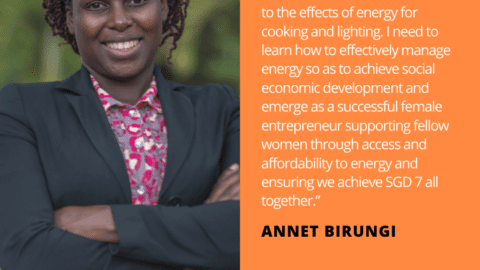GWNET brings you the 20th instalment of the “Meet the Women in Clean Cooking” series which celebrates the work and achievements of the women who are part of the Clean Cooking Mentorship Program. This program is made up of 30 mentee-mentor tandems, with mentees from over 15 countries. Meet Clean Cooking mentee, Eap Sarath, Regional Manager at African Clean Energy (Energy Solution Cambodia) in Cambodia
1) Tell us a little about yourself. What do you love most about what you do?
I have worked for Energy Solutions Cambodia for 2 years as Regional Manager. What I love most about what I do is bringing clean cookstoves to the people.
I work hard to make our program successful considering the cultural, economic and social concerns, to maximize the fit of our cookstoves for my local context.
I am keen to protect the environment. I feel this topic is increasingly important in the modern world where excess consumption and waste are everywhere. I also have a keen interest in languages and I believe that a working knowledge in a few languages will enable anyone to work and travel the world.
I am passionate about reading, travelling and enjoying this pastime as much as possible. Travel is very important for me as I wish to discover new cultures and lifestyles for myself. I have recently become interested in design and decoration and currently, I am learning new aspects in my free time. I also love any kind of sport.

2) What were your goals when you started working in clean cooking? How have these evolved?
I became interested in clean cooking because I wanted to improve the life of my mother. Buying her a cookstove was my first step in changing her life. Little did I know that this decision will also change my life, and the lives of so many other women in Cambodia.
Clean cookstoves have so many positive impacts on the environment, the economy and the health of people, in particular women and children.
3) What are the opportunities for clean cooking in your country?
The opportunities for clean cooking in Cambodia are huge. Many people, in particular women, are still cooking with unsustainable dirty fuel. Women in Cambodia shouldn’t die from preparing food for their families but the smoke from burning wood is not good for their health.
In addition, collecting wood is time-consuming. Therefore, women and girls do not have time to go to school and learn. Related to my own story, I was supposed to do housework and prepare food most of the time, and in this culture, it is a woman’s job.
Cambodian people typically use wood from illegal deforestation to cook. The trees are often not replanted. This damages the environment.
Clean energy is not just about cooking but also about electricity, which is needed to have light and charge phones. Some parts of Cambodia have no access to electricity for their day to day life. They still use candles.
Clean cooking can promote collaboration, learning and knowledge sharing, as well as help the private sector develop and deliver efficient cooking solutions to society.
The challenges that I have faced in the sector are diverse. Personal challenges include defying cultural norms/habits, shyness, being humble, communication skills, and stress management.
I manage to overcome these challenges through continuous learning, interest and because I was lucky to find a supportive environment. Overall challenges for clean cooking in Cambodia include economic growth, education, transport infrastructure, energy, health, poverty and equity.
To overcome these challenges we may educate Cambodians on how bad the air pollution is and change behaviour through community outreach and social media.
Investments in this strategy aim to provide cleaner, more efficient cookstoves to women while also giving them income-generation opportunities as business owners and entrepreneurs at the centre of the clean cookstoves value chain.
First and foremost, I would like to build on my strengths and improve my professional weaknesses so I can introduce my learnings from this mentorship program to Cambodia and empower other women in my field. In 5 years I would like to have continued to develop and strengthen these skills through practice and feel confident to take them into the international workplace.
6) What advice would you give to women hoping to join the clean cooking sector?
Learn and share knowledge as much as you can with other women.
Women are the primary users of cookstoves, often bearing familial responsibility to prepare meals and secure cooking fuel, such as firewood. It is women who can relate to this experience, so their involvement in the clean cooking sector is crucial in promoting change.
Other than this, I would advise them to be committed and strong in the workplace, as it can be difficult to compete with men in our culture. One way is to continuously challenge yourself and try to be involved and educated in new activities and ideas in the industry to improve knowledge and remain competitive.
Read more about GWNET’s mentoring programmes here.











